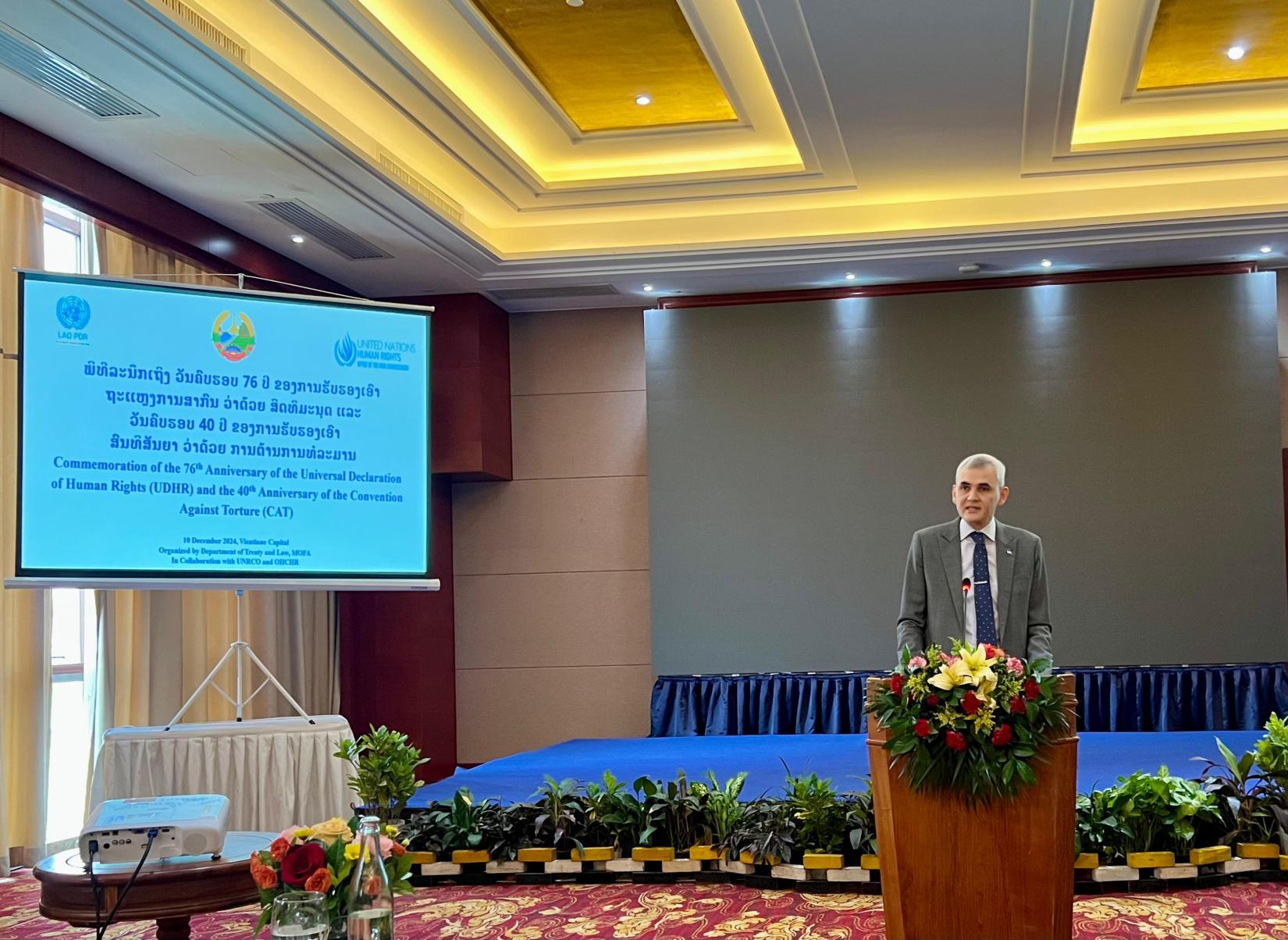Opening Remarks at Celebration of the Human Rights Day in Lao PDR
Opening Remarks by Bakhodir Burkhanov, UN Resident Coordinator

Excellency Mr. Thongphane Savanphet, Vice-Minister of Foreign Affairs, Deputy Chair of the National Committee on Human Rights
Excellencies Ambassadors
Representatives from the Government and partner organizations
Ladies and gentlemen –
I am honored to speak at this year’s Human Rights Day celebrated globally on 10 December. End of the year puts a spotlight on several inter-connected human rights commemorations and themes – from 16 days of activism against gender-based violence, to disability inclusion, and the rights of persons living with HIV – culminating in the Human Rights Day. This important day provides an opportunity to reflect on the critical role of human rights as a preventative, protective, and transformative force for good.
Human rights serve as a foundation for effective governance and empower individuals and communities, providing both a moral and legal anchor for all of our aspirations to live with dignity and justice.
In 2024, this reflection is amplified by the 40th Anniversary of the Convention against Torture and Other Cruel, Inhuman, or Degrading Treatment or Punishment (CAT), which also falls on 10 December.
For Lao PDR, the timing is particularly significant as the country prepares to submit its Initial State Report to the Convention and to engage in the fourth cycle of the Universal Periodic Review (UPR). These milestones offer an opportunity to align national priorities with international commitments, setting the stage for concrete progress in human rights and towards achieving the 2030 Agenda for Sustainable Development.
Adopted in 1984 and ratified by 174 states, the CAT emerged as a response to widespread torture and repression. Over four decades, CAT has achieved significant milestones and established international standards to prevent torture and protect victims, sending a clear message: torture must be condemned and prohibited universally.
In 2024, Lao PDR has taken a significant step in the fulfillment of its obligations to CAT by submitting its Initial State Report to the Committee overseeing the implementation of the Convention. Drafting the report involved consultations and data collection, shedding light on existing gaps and opportunities to strengthen protections.
Distinguished guests –
The Universal Periodic Review, established in 2006, is a peer-review mechanism under the UN Human Rights Council that evaluates the human rights practices of all UN Member States every 4-5 years. Its ultimate aim is to improve the human rights situation in all countries and address human rights issues wherever they occur.
During the UPR, countries have the opportunity to declare what actions they have taken to improve the human rights situation, and to exchange lessons learned and technical support with other peers.
For Lao PDR, the fourth UPR – scheduled for April 2025 – provides an important platform to revisit long-standing human rights challenges, address recommendations from previous cycles, and showcase progress in key areas like gender equality, the rights of groups in vulnerable situations, such as persons with disabilities, victims of trafficking, children and older persons, ethnic groups, and persons living with HIV.
The Government of Lao PDR has been preparing for the fourth UPR throughout this year, including by holding consultations on its national report with central and local governments and civil society organizations. Its response to recommendations received in the fourth cycle and their implementation afterward will be a litmus test for Lao PDR’s dedication to human rights protection.
While Lao PDR has shown progress in meeting its reporting obligations under the CAT, UPR, and other UN human rights mechanisms, tangible action beyond reporting can be further strengthened. Effective human rights protection requires robust legal frameworks and consistent enforcement in order to ensure accountability and combat impunity. In Lao PDR, this would mean legislative reforms, enhancing civil society engagement, and tackling inequalities, with collaborative efforts across government and civil society, with support from international partners.
Ladies and gentlemen –
The UN continues to collaborate closely with the Government of Lao PDR on key human rights issues, including social and cultural rights, environmental rights, and the protection of vulnerable groups.
In June, the UN High Commissioner for Human Rights visited Lao PDR for the first time, meeting with government authorities and delivering a lecture to students at the Faculty of Law and Political Science at the National University of Laos.
Human Rights Day 2024 reminds us that human rights are the common thread that binds us all together to foster peace and stability; that human rights are not abstract ideas, but offer protection, ensuring everyone, everywhere can live in dignity and respect; and that upholding human rights is not only about addressing existing inequalities, but also about empowering marginalized groups so everyone can thrive.
I extend my appreciation to the Ministry of Foreign Affairs for leading this important engagement, and thank you all for joining us at today.


